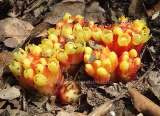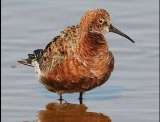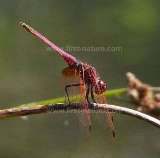Algarve Specialities
Because of the similaries of the climate to Spain, Italy, Greece and other countries which surround the Mediterranean Basin we think of the Algarve as being Mediterranean, but in fact the whole of Portugal, including the Algarve, faces the Atlantic ocean. Although the Algarve tends to have long, hot and dry summers in common with the other Mediterranean countries, its close proximity to the Atlantic means that it has much wetter winters.
The Algarve is recognised as a 'biodiversity hotspot' and provides homes to literally thousands of species of plants and animals. This section of the website celebrates that diversity and features some of the wildlife that is special to the region.

Sorting out the Cistus
Pictures and descriptions of cistus plants in the Algarve

Cytinus Hypocistis and Cytinus ruber
Parasitic plants of Cistus species in the Algarve

Give Waders a chance...
Ray Tipper's guide to identification of waders in the Algarve

A living river by the door...
Please Help Us: If you have found this information interesting and useful, please consider helping to keep First Nature online by making a small donation towards the web hosting and internet costs.
Any donations over and above the essential running costs will help support the conservation work of Plantlife, the Rivers Trust and charitable botanic gardens - as do author royalties and publisher proceeds from books by Pat and Sue.

